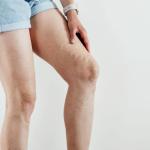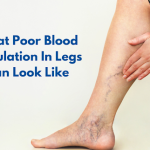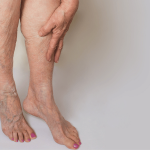
Picture this: You’re finally going on that dream vacation you’ve been planning for the last two years – You can’t wait for some rest and relaxation as you’ve been working long hours and are exhausted. Your legs have been bothering you as well, but you figure this is normal, after all, you’re tired. You make your way to your seat on the plane, breathe a sigh of relief and settle in for the scheduled 7-hour flight. However, barely an hour into your flight, your legs start to swell, and you begin to feel a burning sensation in your legs. All you want to do is get up and walk around, move a bit but then you notice the captain turns on the seatbelt sign and…. Here comes some turbulence.
Sound familiar? Well, it happened to me! Landing at my destination excited for the adventure and chance to mentally disconnect, only to end up being distracted by the discomfort in my legs, putting a damper on my vacation. If you have experienced this, you are not alone! In fact, 1 in 10 men and 1 in 3 women in the U.S. suffer from what is known as CVI or Chronic Venous Insufficiency. You may know it as varicose vein disease.
Take Our Online Vein Symptoms Quiz
But what causes varicose veins and why can it make your legs burn?
Normal blood flow is supposed to carry nutrient rich, oxygenated blood away from the heart to the cells in the body. Once at the cells, just like public transit, it drops off the nutrients and oxygen and picks up the waste products such as carbon dioxide. Then blood flow then carries the waste products through the veins back toward the heart, to drop off the waste products in the appropriate organs as well as the lungs, where the blood receives a new supply of oxygen.
In the legs, the venous flow works against gravity to help get the blood out of the legs and back towards the heart. To do this, the veins use one-way valves to prevent the flow from dropping back towards the feet. When this system fails, the “public transit system” backs up, causing the blood to pool in the legs.
But what does this have to do with the burning sensation I experience?
Great Question! When the venous blood can no longer flow out of the veins properly, it slowly breaks down the vein walls. Over time, blood, and waste products seep through the vein wall into the tissue. There, the waste products cause irritation and inflammation of the tissue, which can make your legs feel heavy, achy, crampy, restless, and yes, even burn!
The closer to the surface of the skin, the more nerve endings there are. So, if you have varicose veins that protrude, or sit directly under the surface of the skin, as the waste products continue to irritate the tissue over time, it can irritate the nerve endings, creating a burning sensation in your legs.
Now, just because you have burning in your legs, does not mean you have varicose veins. In fact, a burning sensation can also be linked to issues with your arteries or nerves. Be sure to discuss your concerns with your primary care physician so they can direct you to the right specialist.
If there is a silver lining to the leg burning, it is that it is a warning sign! It’s your body’s way of telling you something is wrong, and you should seek help. That’s where we come in! While there are some things you can do at home that may temporarily relieve some of the discomfort from chronic venous insufficiency, such as wearing compression stockings, the best thing to do for many patients is treat the burning caused by varicose veins at the source.
Managing your CVI is considered elective, because although it is not an emergency, it IS a progressive disease, and over time it can cause discomfort, chronic swelling, as well as skin discoloration and even ulcers in some people. The treatment for CVI has come a long way over the years and is now covered by most major insurance providers.
Medically Reviewed By:
Dr. Yan Katsnelson is a philanthropist, business owner, and highly skilled cardiac surgeon. He is the Founder and CEO of USA Vein Clinics, which is part of USA Clinics Group, the parent company of USA Fibroid Centers, USA Vascular Centers, and USA Oncology Centers, with more than 100 facilities nationwide. Dr. Yan has established himself as a strong advocate for accessibility and affordability of the most advanced medical care close to home. His mission is to create a positive experience for each patient with compassionate, personalized, and expert care.






